Dorsal artery of the penis
The dorsal artery of the penis is an artery on the top surface of the penis. It is a branch of the internal pudendal artery. It runs forward on the dorsum of the penis to the glans, where it divides into two branches to the glans penis and the foreskin (prepuce).
| Dorsal artery of the penis | |
|---|---|
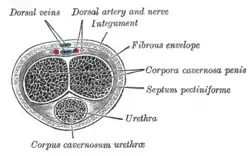 Transverse section of the penis. (Dorsal artery visible at top.) | |
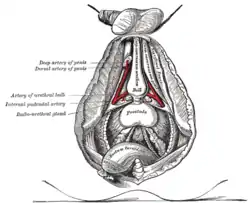 The deeper branches of the internal pudendal artery. (Dorsal artery of penis labeled at upper right.) | |
| Details | |
| Source | internal pudendal artery |
| Vein | deep dorsal vein of the penis |
| Supplies | penis |
| Identifiers | |
| Latin | arteria dorsalis penis |
| TA98 | A12.2.15.044M |
| TA2 | 4354 |
| FMA | 19795 |
| Anatomical terminology | |
The dorsal artery of the penis supplies the integument and fibrous sheath of the corpus cavernosum penis, the glans penis, the foreskin, and the skin of the distal shaft. It also branches with circumflex arteries that supply the corpus spongiosum. Its role in erectile function is unknown.
The dorsal artery of the penis may be damaged in traumatic amputation of the penis and repairing the dorsal artery surgically prevents skin loss, but it is not essential for sexual and urinary function. Its hemodynamics and blood pressure can be assessed to test for sexual impairment.
Structure
The dorsal artery of the penis is a branch of the internal pudendal artery.[1][2] It ascends between the crus penis and the pubic symphysis of the pelvis.[3] As it pierces the perineal membrane, it passes between the two layers of the suspensory ligament of the penis. It runs forward on the dorsum of the penis to the glans.[2] At the glans, it divides into two branches to the glans penis and the foreskin (prepuce). On the penis, it lies between the dorsal nerve and deep dorsal vein.[3]
The dorsal artery give perforators to the corpus cavernosum penis. It sends branches through the fibrous sheath of the corpus cavernosum penis to anastomose with the deep artery of the penis. It anastomoses with the artery of bulb of penis.[1]
Function
The dorsal artery of the penis supplies the fibrous sheath of the corpus cavernosum penis.[1] It gives branches to the glans penis,[1][3] and the foreskin (prepuce).[1] Through retrograde flow they help supply the skin of the distal shaft. It also gives branches to the circumflex arteries that supply the corpus spongiosum.
The dorsal artery of the penis gives perforators to the corpus cavernosum penis. Despite this, their contribution to erectile function is inconsistent.
Clinical significance
Trauma
The dorsal artery of the penis may be damaged during traumatic amputation of the penis. Failure to perform re-anastomosis of the dorsal artery (with surgery) leads to skin loss.
Sexual impairment
Sexual impairment in men may be assessed with a small blood pressure cuff to assess hemodynamics and blood pressure.[4]
Additional images
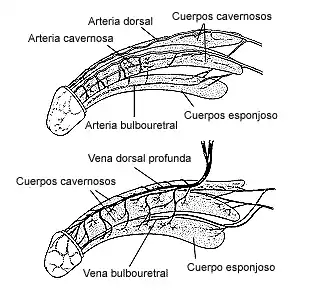 Arteries and veins of the penis (Spanish)
Arteries and veins of the penis (Spanish)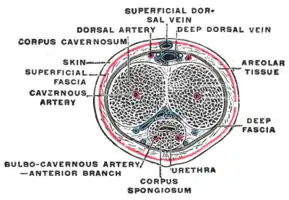 The penis in transverse section, showing the blood vessels.
The penis in transverse section, showing the blood vessels.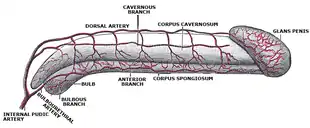 Diagram of the arteries of the penis.
Diagram of the arteries of the penis.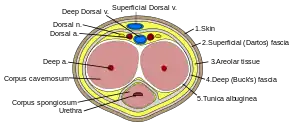 Cross section of penis
Cross section of penis
References
![]() This article incorporates text in the public domain from page 620 of the 20th edition of Gray's Anatomy (1918)
This article incorporates text in the public domain from page 620 of the 20th edition of Gray's Anatomy (1918)
- Jacob, S. (2008). "4 - Abdomen". Human Anatomy. Churchill Livingstone. pp. 71–123. doi:10.1016/B978-0-443-10373-5.50007-5. ISBN 978-0-443-10373-5.
- Clement, Pierre; Giuliano, Francois (2015). "3 - Anatomy and physiology of genital organs – men". Handbook of Clinical Neurology. Vol. 130. Elsevier. pp. 19–37. doi:10.1016/B978-0-444-63247-0.00003-1. ISBN 978-0-444-63247-0. ISSN 0072-9752. PMID 26003237.
- Sadeghi-Nejad, Hossein; Dogra, Vikram; Seftel, Allen D; Mohamed, Mamdouh A (March 2004). "Priapism". Radiologic Clinics of North America. Emergency Ultrasound. 42 (2): 427–443. doi:10.1016/j.rcl.2004.01.008. ISSN 0033-8389. PMID 15136026.
- Kaufman, David Myland; Milstein, Mark J. (2013). "16 - Neurologic Aspects of Sexual Function". Kaufman's Clinical Neurology for Psychiatrists (7th ed.). Saunders. pp. 351–363. doi:10.1016/B978-0-7234-3748-2.00016-5. ISBN 978-0-7234-3748-2.
External links
- Anatomy figure: 42:01-01 at Human Anatomy Online, SUNY Downstate Medical Center - "Cross-section of the penis."
- Anatomy image:9477 at the SUNY Downstate Medical Center
- perineum at The Anatomy Lesson by Wesley Norman (Georgetown University) (maleugtriangle4)
- figures/chapter_32/32-2.HTM: Basic Human Anatomy at Dartmouth Medical School
- figures/chapter_32/32-3.HTM: Basic Human Anatomy at Dartmouth Medical School